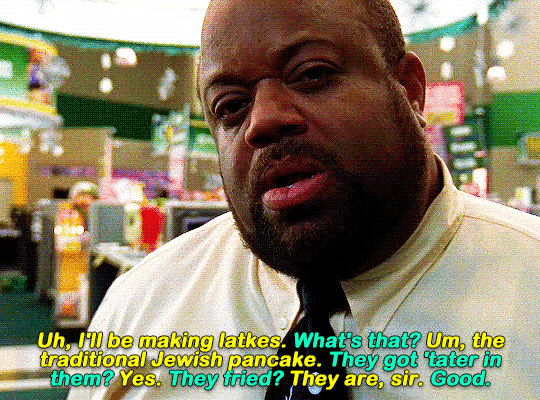#judaism son
Text
Ummmmm I just came home from a Filipino Jewish bakery and y’all…
Filipino Jews have won Purim and maybe the entire baked goods category.
I don’t wanna brag but I’ve acquired an ube challah and an ube hamantaschen and that doesn’t even touch the variety of pandan offerings they had. Omg. This is easily the best discovery I’ve made in my city.
And yes, they ship nationally so I will be ordering from them when I move away.
#Judaism son#Purim#Jewish food#Jewish culture#I love Jewish food mixed with various national cultures!
2K notes
·
View notes
Text

When a 6 day walk took 40 years...
#funny#memes#jewish memes#bad navigator#jumblr#judaism#judaism son#the joys of being Jewish#i know there is more to it than this#tis a joke
1K notes
·
View notes
Photo










Happy Hannukah! 🕎
#happy hanukkah#hanukkah#jewish people represent#i hope you all have a wonderful holiday#jewish#jews#jew#schmidt#judaism son#seth cohen#theoc#crazy ex girlfriend#ace#nancy drew#felicity smoak#arrow#lester patel#chuck#the goldbergs#beverly goldberg#hart of dixie#zoe hart#the nanny#fran fine#friends#f.r.i.e.n.d.s#gifs#gifset#chandler bing#new girl
2K notes
·
View notes
Text
Some Thoughts About Community, as a Convert
I converted through our dually affiliated Reform & Conservative shul. I rarely engage with the Chabad community (the only Orthodox presence near me), and even then, it’s usually in the context of service/cross-community. I NEVER interact with them in a religious context, so my status has never come up.
I don’t put myself in a situation where I know I’ll be disappointed. So many people try and push their way into Orthodox spaces, where they know they’ll be rejected, and then have to deal with the pain of trying to integrate into a community that was never going to accept you anyways.
Long story short, I’m not an Orthodox Jew. I don’t care what the Orthodox community would have to say about me. My Jewish community is just as authentic.
10 notes
·
View notes
Text
Judaism be like :
milk and honey (affectionate)
milk and honey (derogatory)
11 notes
·
View notes
Text
Me: ugh it's November, why the goys have to have their Christmas stuff out already?
Also me on November 1st: OHHH CHANUKAH, OH CHANUKAH, COME LIGHT THE MENORAH
31 notes
·
View notes
Text
today i lived for that grilled cheese after fasting
4 notes
·
View notes
Text
36 Times.
The Torah commands the Jewish people to welcome the stranger thirty six times, more than any other mitzvah (commandment/good deed). More than it asks one to keep kosher, give tzedakah or to pray. Thirty six times, we are enjoined to comfort the wanderer, the lost, the suffering, the refugee.
1 note
·
View note
Text
The Learned Son: Was privileged enough to get a Jewish education, and grew up with a passion for Jewish learning and Judaism. Always knows the answer to a Judaism question, and can come off as a bit haughty sometimes, but does have the best intentions.
The Evil Son: Grew up with access to racial and economic privilege, and because of this, decided that antisemitism isn't a big deal anymore and that Judaism and Jewish culture isn't relevant. Unlike the Simple Son and the Son Who Does Not Know To Ask, the Evil Son had access to a Jewish education and community, but they rejected it.
The Simple Son: Had a minimal exposure to Judaism, but has a true love for Judaism and wants to learn more. They did not have access to a Jewish education, and so they always have so many questions.
The Son Who Does Not Know To Ask: Is so overwhelmed by Judaism that they don't know where to start or what they want.
423 notes
·
View notes
Text
Do not go gentle into that good night,
Old age should burn and rave at close of day;
Rage, rage against the dying of the light.
#every wise man's son doth know#what is love? t'is not hereafter#present mirth hath present laughter#dylan thomas#poetry#judaism#am yisrael chai#jumblr#jewish#jewblr#i stand with israel#antisemitism#I was ready to go gentle into that good night#to die unmarried and childless like every millennial#but the burn and rage of antisemites woke my love of day#I will rage rage against the dying of the light#now i'll marry and have as many kids as I can#and teach them to love judaism and knowledge and wisdom and life and love and kindness with all their hearts and souls#I want them to get DRUNK on the love of life and living#and learn to love jewish life as much as I#we will rage rage against the dying of the light#congratulations antisemites#you woke the love of life and living in this jew#I will make my time on earth count#and make sure there are those who will come after me#we will RAGE -- RAGE against the dying of the light
91 notes
·
View notes
Text
So PMS-y and emotional right now that I just looked up pictures of trees and started tearing up because I just love trees so much.







😭😍trees😍😭
I have a fig tree and a pomegranate tree in my backyard and it may be the hardest part of this house to leave behind.
384 notes
·
View notes
Text
adventures in christian opinions about judaism
(reposted from Twitter)
So a while back I started writing a thing on the trio of parables that ends with the prodigal son (which I still need to finish) and like MAN OH MAN do Christian commentators insist that Jews hate shepherds.
Like, I can't even count the number of commentaries that insist that shepherds were "despised figures" for first-century Jews and the parables of the lost sheep and lost coin were designed to insult the Pharisees by comparing them first to a shepherd and then to a woman.
So, as is my wont whenever Christian commentators make a claim about what was normal for first-century Judaism, I decided to try to hunt down their source on this.
As I've said many times, when it comes to Christian parable interpreters' claims about what attitudes/beliefs/etc. were normal for first-century Jews, get used to the phrase "no sources are cited."
I mean, first off, as a 21st-century Jew, the insistence that 1st-century Jews hated shepherds rings odd, given that <checks notes> Abraham, Isaac, Jacob, Rachel, all of Jacob's kids (the founders of the tribes), David, etc. were all sheep-tenders. The image of God as a shepherd is pretty consistent throughout the Tanakh. That image reappears in the Qumran texts, which as far as I know, are one of the few Jewish sources we have from 1st-century Judaea.
The term "despised" gets used a lot, so I decided to dig into that one.




When I was able to find citations, I traced them back to an 1882 commentary by a guy named Frederic Farrar.
Farrar cites Heinrich Meyer as a source for this, but when I looked up THAT citation, it's Meyer saying that shepherds were a "lowly but patriarchally consecrated class" -- in other words, poor, but with a distinguished history and status.
So that's why everyone's tossing the term "despised" around--because Farrar just made it up. But what about primary sources? I went back on the hunt.
Surprisingly, in a number of reference works, like glossaries and Jeffers's "Greco-Roman World of the New Testament," I found similar assertions about the common attitude toward shepherds, for which they cited...
<drum roll>
Aristotle. You know, the Greek guy who lived 300 years before Jesus? Definitely a reliable source for Jewish attitudes of the time.
Some people cited Philo's On Agriculture. Okay, Philo was at least Jewish and lived when Jesus would have, although he was a wealthy Hellenized Jew living in Alexandria rather than a Pharisee living in the Galilee. But okay, at least it's the right culture and time period. (The reference in Philo turns out to be talking about the section of Genesis in which Joseph's brothers come visit him in Egypt. It talks about how they were proud to be shepherds, and criticizes (gentile) kings who look down on shepherds.)
Then we've got Mishnah Kiddushin, in which a bunch of rabbis are having a debate about which professions make you trustworthy vs untrustworthy, and one rabbi lists everyone from camel-drivers to herders to barbers to shopkeepers as untrustworthy. Another rabbi comes back and is like, nah, all those people are fine upstanding folks; it's doctors and butchers you've gotta watch out for. So they're citing one cranky dude with a LONG list of people he doesn't like, who immediately gets shot down, as evidence of the normative attitude for Jews about a century earlier.
Oh, and we've got a citation of Midrash Tehillim which says that God-as-shepherd doesn't have any of the failings of humans-as-shepherds, which... sure. Also, it was codified in the 1300s?
The most compelling citation is from the Talmud (Sanhedrin 25b), in which the rabbis discuss who's qualified to be a legal witness. They exclude shepherds, because shepherds graze their animals on other people's land, which some of the rabbis see as a type of theft.
The Talmud is a record of debates, but this passage definitely makes it sound like this is a majority opinion. (It should be noted that the passage disqualifies all KINDS of people, from those who lend with interest to those who fly pigeons, as having conflicts of interest.)
But the important thing here is that the Talmud includes records of debates from as late as the 4th or 5th centuries CE (300-400 years after Jesus's time), and the passage makes a point of noting that the disqualification of shepherds as witnesses is a later development.
So in other words, the idea that the Pharisees hated shepherds and would have been insulted by Jesus telling a story in which the protagonist was a shepherd is based either on Greek attitudes that are 300 years too early or Jewish ones that are 300-400 years too late.
But people will twist themselves into citation knots (or just not bother citing a source at all) to insist that this was a common attitude so they can position the Pharisees as hating those charming humble shepherds and their fuzzy little lambs.
As to WHY this idea seems to be so important to them, well, you cannot read about Luke 15 without encountering the word "outcast" roughly 90 times per page.
The framing is Jesus was friend to The Outcasts while the Pharisees despised The Outcasts and the Lost Sheep, Coin, and Sons are all parables about accepting The Outcast.
Never mind that neither the sheep, the coin, nor either of the sons got kicked out of their communities. The sheep wandered off, as sheep are wont to do, the coin was lost by its owner, and the younger son decided to leave to go on a spending spree while the older son declined to attend the welcome back party for him after his dad managed to hire a band and caterers but never thought to let his own son know what was going on and he had to find out from a hired hand.
Moreover, the term "outcasts" gets used as a synonym for "tax collectors and sinners." Tax collectors were usually pretty well-off because they ran a protection racket for the Romans. Outcasts? I mean, I guess? But hardly in the "marginalized and powerless" sense.
As far as "sinners," the NT doesn't usually bother telling us what, exactly, they did to "sin," but on the rare occasions when it does offer that context, it's almost always wealthy people.
But why talk about that when they can present the objection the Pharisees had to Jesus's dining with "tax collectors and sinners" as the Pharisees despising lowly outcasts, and insist that the Pharisees hated the idea of such people repenting and returning, and so Jesus was tweaking their noses by comparing them to shepherds and women.
As if, you know, teshuvah wasn't something the Pharisees were ALL ABOUT. If you want to actually understand, consider that the iconic tax collector in the parable of the Pharisee and the tax collector shows no inclination to STOP being a tax collector.
The objection wasn't you're having a friendly dinner with poor lowly outcasts for whom we have contempt. It was you're having a friendly dinner with people who are extorting their neighbors on behalf of the invaders who kill us for looking at them funny and have expressed no intention to stop doing that.
Now, there's a good discussion to be had about whether shunning Trump lawyers and Marjorie Taylor-Greene donors or inviting them to dinner and trying to win them over with compassion is more effective, more ethical, more compassionate (to whom?), etc.
But presumably we can see why people of intelligence and goodwill might disagree on which of those approaches is the right thing to do, and why such people might might object to the strategy they don't agree with.
But what really gets me is that Christians have the utter fucking NERVE to paint the Pharisees as inhumanly awful for not wanting to have dinner with tax collectors while viewing Corinthians as Holy Writ:

I mean, Paul's all YOU MUST SHUN ALCOHOLICS AND PEOPLE WHO ARE GREEDY and Christians are like yes, that makes sense, but if the Pharisees are like, no, I don't want to have dinner with that guy who narced on my cousin and got him crucified, Christians are like, they're monsters.
Cool, cool.
Anyway, this has been your weekly edition of Christians Need To Stop Just Making Shit Up About Jews And Then Citing Each Other Like It's Fact.
And there were a lot of "I've never heard anyone say Jews of Jesus's time hated shepherds..." responses: Maybe you haven't, but that doesn't make it uncommon.
Sources in which I've found it:
Craig Blomberg (Denver Seminary, Society of Biblical Literature, Tyndale House, NIV translation committee)
Jared Wilson (professor at multiple Baptist seminaries)
Stephen Wright (Spurgeon College (British evangelical college))
Arland Hultgren (Luther Seminary (ELCA))
Kenneth Bailey (Presbyterian/Episcopalian)
Joachim Jeremias (Lutheran, cited EVERYWHERE)
Bernard Brandon Scott (Disciples of Christ, the Jesus Seminar)
Klyne Snodgrass (Evangelical Covenant Church)
Barbara Reid (Catholic Biblical Association)
That particular trope spans denominations, decades, etc. It's not a fringe viewpoint.
#christian exegesis#antisemitism#jumblr#citational politics#bad methodology#parables#pharisees#first century judaism#second temple judaism#good shepherd#prodigal son#why are christians like this?
366 notes
·
View notes
Text
Hi, nice to meet you! Thanks for coming to my blog. Expect content about Judaism and Jewishness.
Here are some fast facts about me:
•My name is Avi
•I’m 21 years old. I’m in college, and I’m a big Hillel guy
•I’m Reform (though I belong to a dually affiliated Reform/Conservative temple, so my individual affiliation is a bit muddied by this)
•I’m American
•My favorite holiday is Purim
•My favorite dinosaur is Parasaurolophus
2 notes
·
View notes
Text
Y'all ever just chill in the synagogue parking lot before service or just me
4 notes
·
View notes
Text
Zionists are often some of the most antisemitic people I've ever had the misfortune of speaking with. BECAUSE you will say something like "I hate people who think it's okay to kill ten thousand children and then mock their grieving parents in extremely racist costumes" and some chud will show up like "SO YOU HATE JEWS? JUST SAY YOU HATE ALL JEWS AND GO" like. If you heard what I said and immediately equated it with jewish people then I don't know what to tell you man. If you take "down with murderers" as a threat that's on you.
#some of these guys are like two steps away from defending the son of sam serial killer#could be wrong but im like ninety nine percent sure wholesale murder is not a jewish value nor does a jewish person committing murder#reflect on the community as a whole#i dont refer to a single fucking person or group critically as jewish#they are zionists and racists and israelis#because those are the beliefs that fuel their bigotry. not judaism.
16 notes
·
View notes
